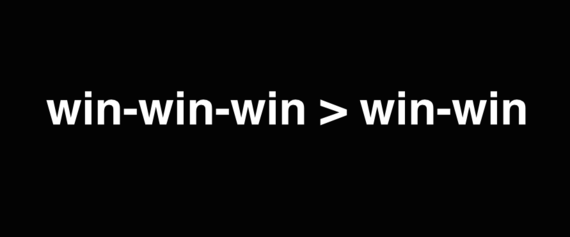A "win-win" situation is a scenario wherein the two people involved mutually benefit from one another. For instance, an angel investment in a startup is a win-win situation since the founders get funds to take their venture to the next level and investor creates an opportunity of financial gain for him or herself. Another example could be you providing your marketing services to an entrepreneur on a tight budget for a reduced fee. Such situations are not bad. They are really great and can open up doors to several other potential agreements for the parties involved.
Having said that, I strongly believe that "win-win-win" situations are much better in terms of the vastness of room for personal growth and development of deep relationships with others for future opportunities.
Everyone should strive to create more "win-win-win" situations than "win-win" situations for themselves.
What is a win-win-win situation?
"Win-win-win" is situation in which you are not directly involved in an agreement between two people who stand to benefit, either in their personal or professional growth. How is this a win for you? You stand to benefit exponentially in the future if you were instrumental in enabling those two people to reach to a mutually-beneficial act. Over the summer, I introduced two young entrepreneurs to each other because they had worked in the same domain with different approaches and I thought it would be cool for them to get to know each other. By merely making an email introduction, I benefitted indirectly in several ways:
- I strengthened my personal relationship with two talented entrepreneurs.
- One of them publicly acknowledged how helpful I was to one of his friends.
- This improves my goodwill and personal brand.
- They are more likely to be very receptive if I ever need their assistance in the future for my own ventures.
- Most importantly, I expanded my network (read as support system ).
Instead of segregating different parts of your networks over a timeline, try to connect the dots. There could be a friend of yours from your alma mater who is actively looking to cover new stories to grow her blog on innovation in education. You might know someone else who is just getting a company off the ground that helps students collaborate on educational projects. If I were you, I would connect the two since both of them will get to meet a new person, invest in their personal growth and, most importantly, they will remember your generosity and thoughtfulness.
Being an unconditional connector is absolutely worth your while. It benefits the group of people around you as well as yourself. The only caveat to remember is not to get abused for your generosity of connecting with and helping others.
A couple days ago, one of the two entrepreneurs I mentioned earlier gave me the contact information of a highly-successful individual that I really wanted to get in touch with. And those details aren't easy to find on the internet.
Think big. Be generous. Think long term. And be smart about it.
Here is one of my favorites articles on becoming a connector by James Altucher.
Here's another article on relationship management by Ferrazzi Greenlight's CEO Keith Ferrazzi, the Author of the Best Selling books "Never Eat Alone" and "Who's Got Your Back".
Here's how I ended up getting featured in Forbes without even trying to get featured.
-@sarthakgh
